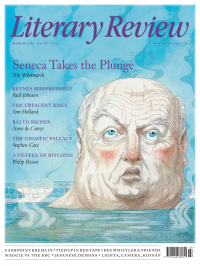John Harwood
Hot off the Press
This is the end of the world news, brought to you by the Intergovernmental Panel on Climate Change: catastrophic climate change is now inevitable. If all fossil-fuel emissions ceased tomorrow, temperatures would still rise by at least 2°C this century, the ‘maximum safe upper limit’ adopted at the Copenhagen summit in 2009. Two degrees of anthropogenic warming would be disastrous enough: we would see hundreds of millions of ‘climate refugees’, low-lying countries inundated, unprecedented heat waves, massive crop failures. The IPCC isn’t (yet) allowed to use words like ‘catastrophic’ in its executive summaries, but the consensus among the hundreds of climate scientists who compiled its latest reports is that if we carry on burning fossil fuels at the current rate, temperatures will increase by at least 4°C, perhaps as soon as 2060.
Despite the best efforts of the environmentalists (notably Bill McKibben, who has inspired a global survival movement), climate change still ranks very low in surveys of voters’ concerns in North America, the UK and Australia. If you happen to live in Alice Springs, four degrees of warming sounds pretty grim,

Sign Up to our newsletter
Receive free articles, highlights from the archive, news, details of prizes, and much more.@Lit_Review
Follow Literary Review on Twitter
Twitter Feed
Princess Diana was adored and scorned, idolised, canonised and chastised.
Why, asks @NshShulman, was everyone mad about Diana?
Find out in the May issue of Literary Review, out now.
Literary Review - For People Who Devour Books
In the Current Issue: Nicola Shulman on Princess Diana * Sophie Oliver on Gertrude Stein * Costica Bradatan on P...
literaryreview.co.uk
Under its longest-serving editor, Graydon Carter, Vanity Fair was that rare thing – a New York society magazine that published serious journalism.
@PeterPeteryork looks at what Carter got right.
Peter York - Deluxe Editions
Peter York: Deluxe Editions - When the Going Was Good: An Editor’s Adventures During the Last Golden Age of Magazines by Graydon Carter
literaryreview.co.uk
Henry James returned to America in 1904 with three objectives: to see his brother William, to deliver a series of lectures on Balzac, and to gather material for a pair of books about modern America.
Peter Rose follows James out west.
Peter Rose - The Restless Analyst
Peter Rose: The Restless Analyst - Henry James Comes Home: Rediscovering America in the Gilded Age by Peter Brooks...
literaryreview.co.uk